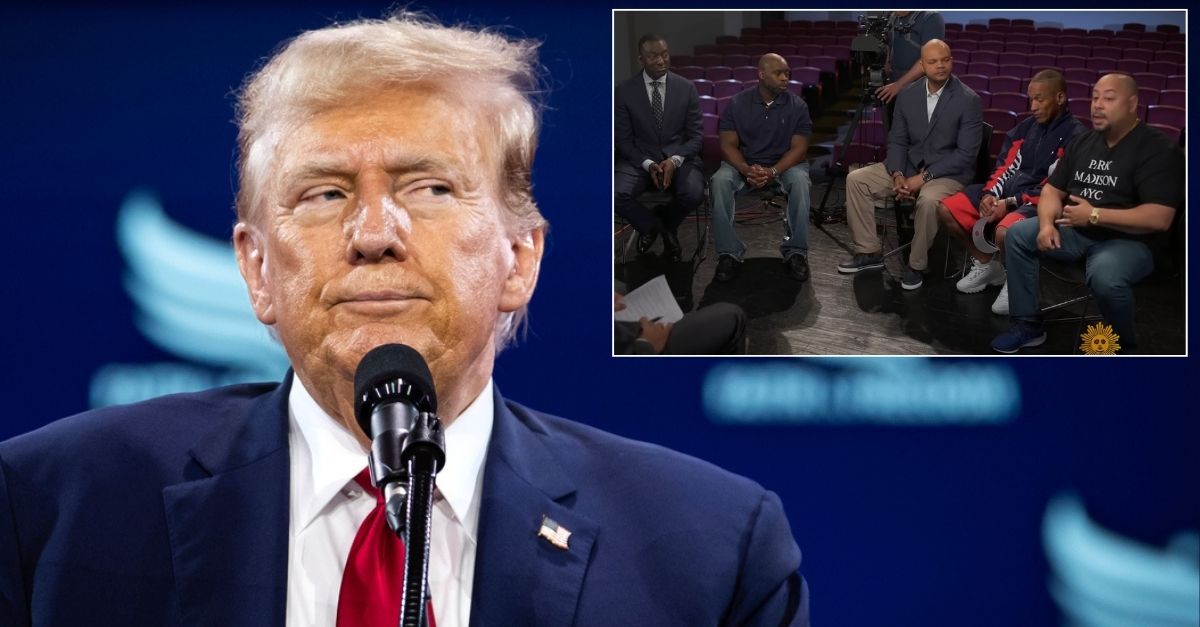
Inset, left to right: Yusef Salaam, Antron McCray, Korey Wise, Kevin Richardson, Raymond Santana appear on CBS Sunday Morning, May 12, 2019 (CBS Sunday Morning). Background: Donald Trump speaks at the annual Road to Majority conference in Washington, DC, June 22, 2024. (Allison Bailey/NurPhoto via AP)
The Central Park Five urged a federal judge in Pennsylvania not to allow several nonparty media organizations and trade associations — as well as the ACLU — to weigh in on their defamation lawsuit against President-elect Donald Trump, saying the effort amounted to nothing more than “bullying” aimed at advancing their business interests.
The wrongly-accused quintet sued Trump for allegedly false statements he made during last year’s presidential debate with Kamala Harris in which he said the men “pled guilty” to the horrific attack and “ultimately killed a person.” Yusef Salaam, Antron McCray, Korey Wise, Kevin Richardson, and Raymond Santana gave police coerced confessions, but never pleaded guilty, nor did the victim of the attack die.
On Wednesday, a coalition of organizations “with free speech interests” sought to file an amicus brief, meaning that while they are not party to the case, the group believes their information or arguments may help the court come to proper legal conclusions.
In this case, the amicus curiae did not take a position on the merits of the case for either side, but argued that the state’s anti-SLAPP statute, which provides immunity and fee-shifting for defendants who have to litigate frivolous lawsuits, should apply to the Central Park Five’s suit against Trump.
But attorneys representing the plaintiffs said the court should reject the request to file the “friend-of-the-court brief,” as the coalition was just using the opportunity to intimidate any prospective victims who might sue their organizations.
“Movants’ brief is nothing more than a bullying effort to advance Movants’ own business interests by deterring victims of wrongful conduct from seeking redress in the courts,” the Central Park Five’s attorney, Shanin Specter, wrote in the eight-page filing
Specter also noted that because Trump had not filed a motion for attorneys fees, the issue was not even before the court.
“Movants ‘take [] no position’ on Defendant’s [] motion to dismiss — which is the only motion pending in this case — and thus their participation as amici would be unhelpful and unnecessary to resolving the actual issues before the Court,” the filing states.
The amicus coalition seeking to file the brief is made up of the ACLU of Pennsylvania, Americans for Prosperity Pennsylvania, Electronic Frontier Foundation, Foundation for Individual Rights and Expression, Institute for Free Speech, Pennsylvania Association of Broadcasters, Pennsylvania NewsMedia Association, Radio Television Digital News Association, Reporters Committee for Freedom of the Press, and Student Press Law Center.
Trump’s statements during the debate
The lawsuit centers on an exchange between Trump and Harris during the presidential debate on Sept. 10, 2024, viewed by over 67 million people. Harris had just accused Trump of using “race to divide the American people” before referring to Trump’s ads.
“Let’s remember, this is the same individual [Trump] who took out a full-page ad in the New York Times calling for the execution of five young Black and Latino boys who were innocent, The Central Park Five,” Harris said. “Took out a full-page ad calling for their execution.”
“They come up with things with things like she just said, going back many, many years, when a lot of people, including Mayor Bloomberg, agreed with me on the Central Park Five,” Trump replied. “They admitted — they said they pled guilty. And I said, well if they pled guilty, they badly hurt a person, killed a person ultimately. And if they pled guilty — then they pled we’re not guilty. But this is a person that has to stretch back years, forty, fifty years ago, because there is nothing now.”
The legal filings
Attorneys for the plaintiffs have repeatedly argued that Trump’s comments were “demonstrably false.”
“Plaintiffs never pled guilty to any crime and were subsequently cleared of all wrongdoing,” the lawsuit said. “Further, the victims of the Central Park assaults were not killed.”
In addition to claiming his remarks were protected by the First Amendment, Trump has argued that his challenged statements were “substantially true.”
In multiple filings, Trump has asserted that when he said the plaintiffs “pled guilty” and “ultimately killed a person,” those remarks would have virtually the same effect on the average person as the truth. Trump reasoned that while the men never formally pleaded guilty, they did initially confess to police — while under duress.
Similarly, while the victim, Patricia Meili, survived the attack, and is still alive today, Trump said she was left “virtually dead” and “in a coma.”
“As to the attack on Ms. Meili, the proper comparison is whether, in the mind of a listener, an accused’s initial admission to a beating that ultimately left a victim dead would be substantially the same as an initial admission to a beating that left a victim ‘virtually dead,”” a previous motion from the defense stated. “Here too, there would not be a ‘different effect’ on the listener’s mind between the two statements because, in either case, the listener would understand the accused to have admitted to a vicious, murderous beating before recanting.”
The Central Park Five maintain that “whether someone ‘pled guilty’ to having ‘killed someone’ is a factual statement that can be proven true or false.”

![[Zone 7] Murdaugh Murder Mayhem: The Latest on Alex Murdaugh with Joshua Schiffer](https://celebjam.com/wp-content/uploads/2024/02/Zone-7-Murdaugh-Murder-Mayhem-The-Latest-on-Alex-Murdaugh-200x110.jpg)







